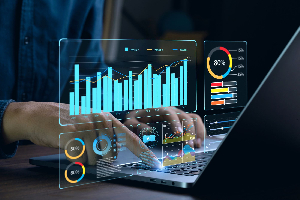 Analytics and AI are reshaping the creator economy
Analytics and AI are reshaping the creator economy
The Evolution of Data-Driven Influencer Marketing
Influencer marketing has undergone a seismic shift over the past decade, evolving from a niche advertising tactic into a dominant force in digital marketing.
What once relied on celebrity endorsements and follower counts has transformed into a sophisticated, data-driven industry powered by artificial intelligence (AI), machine learning, and predictive analytics.
Brands are no longer making blind investments in social media personalities based solely on their follower numbers. Instead, data-driven insights now guide influencer selection, campaign optimization, and audience targeting.
This shift has not only increased efficiency but also elevated influencer marketing into a science, where brands can predict engagement, measure conversions, and maximize return on investment (ROI).
The Rise of AI-Powered Influencer Selection
In the early days of influencer marketing, brands primarily partnered with high-profile celebrities or social media personalities with millions of followers. However, as engagement rates declined and authenticity became a concern, businesses began turning to micro- and nano-influencers—creators with smaller but highly engaged audiences.
AI-powered tools have played a crucial role in this transition. Algorithms now analyze vast amounts of data to identify influencers who align with a brand’s values, audience demographics, and engagement metrics.
These tools evaluate factors like audience sentiment, content authenticity, and historical performance, allowing brands to partner with influencers who truly resonate with their target customers.
Performance Metrics Over Vanity Metrics
Gone are the days when likes, shares, and follower counts were the sole indicators of success.
Today, brands rely on deep analytics to measure the effectiveness of influencer campaigns.
Key performance indicators (KPIs) such as engagement rates, conversion rates, cost per acquisition, and customer lifetime value now take precedence over vanity metrics.
AI and machine learning models track consumer behavior, providing insights into which influencers drive actual sales and which content formats perform best.
This shift has forced both brands and influencers to focus on creating meaningful, high-quality content rather than just amassing large followings.
Predictive Analytics: The Future of Influencer Marketing
One of the most groundbreaking advancements in influencer marketing is predictive analytics. By leveraging historical data, brands can forecast campaign outcomes before they even begin.
AI models analyze past engagement trends, seasonal patterns, and consumer sentiment to predict which influencers and content types will generate the highest ROI.
This predictive capability allows marketers to allocate budgets more effectively, experiment with different content strategies, and reduce wasted ad spend.
It also enables real-time campaign adjustments, ensuring that influencer collaborations remain dynamic and responsive to audience preferences.
Ethical Considerations and the Challenge of Authenticity
While data-driven influencer marketing offers numerous benefits, it also raises ethical concerns.
With AI-generated insights dictating influencer partnerships, there is a risk of prioritizing metrics over genuine human connections.
Over-reliance on algorithms can lead to overly curated and inauthentic content, diminishing the trust that audiences place in influencers. Additionally, data privacy remains a pressing issue.
The collection and analysis of vast amounts of user data must be conducted transparently, ensuring that consumers’ digital footprints are not exploited without consent.
As regulations surrounding data privacy tighten, brands and influencers must strike a balance between leveraging data and maintaining ethical marketing practices.
Conclusion: The New Era of Influencer Marketing
Data-driven influencer marketing is not just a trend—it is the future of digital advertising.
The integration of AI, machine learning, and predictive analytics has transformed influencer marketing from a speculative investment into a precise and measurable strategy.
As brands continue to harness data to drive engagement and conversions, influencer marketing will only grow in sophistication.
However, as we embrace this tech-driven evolution, we must not lose sight of the human element. Authenticity, creativity, and ethical responsibility must remain at the core of influencer marketing strategies.
After all, the true power of influencer marketing lies in its ability to build trust and foster genuine connections—something that even the most advanced AI cannot fully replicate.